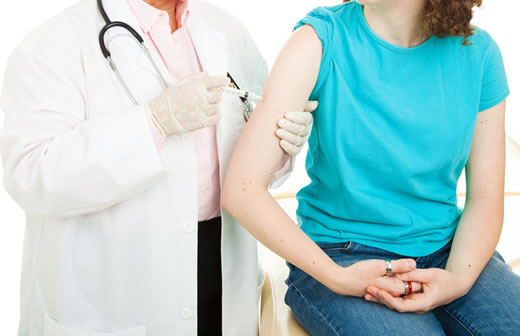In the first study examining clinical markers of sexual activity after receiving the human papillomavirus (HPV) vaccine Gardasil, researchers at Emory University and Kaiser Permanente found no association between the vaccine and an increase in sexual activity among girls. The results were published online today in the journal Pediatrics.
The study, an independent research project funded by Kaiser Permanente and Emory University, included 1,398 girls ages 11 to 12 who were members of the Kaiser Permanente health plan in Georgia in 2006 and 2007, during the first 18 months after the Gardasil vaccine became available.
"Our study found a very similar rate of testing, diagnosis and counseling among girls who received the vaccine and girls who did not. We saw no increase in pregnancies, sexually transmitted infections (STIs) or birth control counseling — all of which suggest the HPV vaccine does not have an impact on increased sexual activity," says lead author Robert Bednarczyk, an epidemiologist in Emory University's Hubert Department of Global Health, Rollins School of Public Health and a clinical investigator with the Kaiser Permanente Center for Health Research-Southeast.
Of the 1,398 girls in the study, 493 of them received at least one dose of the HPV vaccine during the study period. The comparison group included 905 girls who received other recommended vaccines but not the HPV vaccine. Researchers followed both groups of girls for up to three years to assess whether they had been tested for or diagnosed with a STI, had taken a pregnancy test and had been counseled about contraceptives.
- About 10 percent of the girls in the study, both those who received the vaccine and those who did not, had one or more of these outcomes.
- The average age of testing, diagnosis or counseling was about 14.5 years old.
- Only eight girls, or less than 1 percent, were diagnosed with an STI or had a positive pregnancy test.
- Girls who received the HPV vaccine did not have a statistically higher rate of testing, diagnosis or counseling compared to those who did not receive the vaccine.
"This is reassuring news for teenagers, parents and members of the public. Our study adds to growing evidence that the HPV vaccine is a safe and effective way to prevent these rare but sometimes deadly cancers," adds Robert Davis, a co-author and senior investigator with the Kaiser Permanente Center for Health Research–Southeast.
Since 2006, the Centers for Disease Control and Prevention has recommended that girls ages 11–12 receive three doses of the vaccine to protect them from HPV, which is transmitted through sexual activity and can cause genital warts and cervical, penile, vaginal and head and neck cancers. The vaccine is also recommended for females ages 13–26 who did not receive the vaccine when they were younger and for males ages 11–21.
In addition to Bednarczyk and Davis, authors include: Saad B. Omer, with the Rollins School of Public Health and Kaiser Permanente Center for Health Research–Southeast; Kevin Ault, and Walter Orenstein, with the Emory University School of Medicine. Omer and Orenstein are also affiliated with the Emory Vaccine Center at Emory University.

